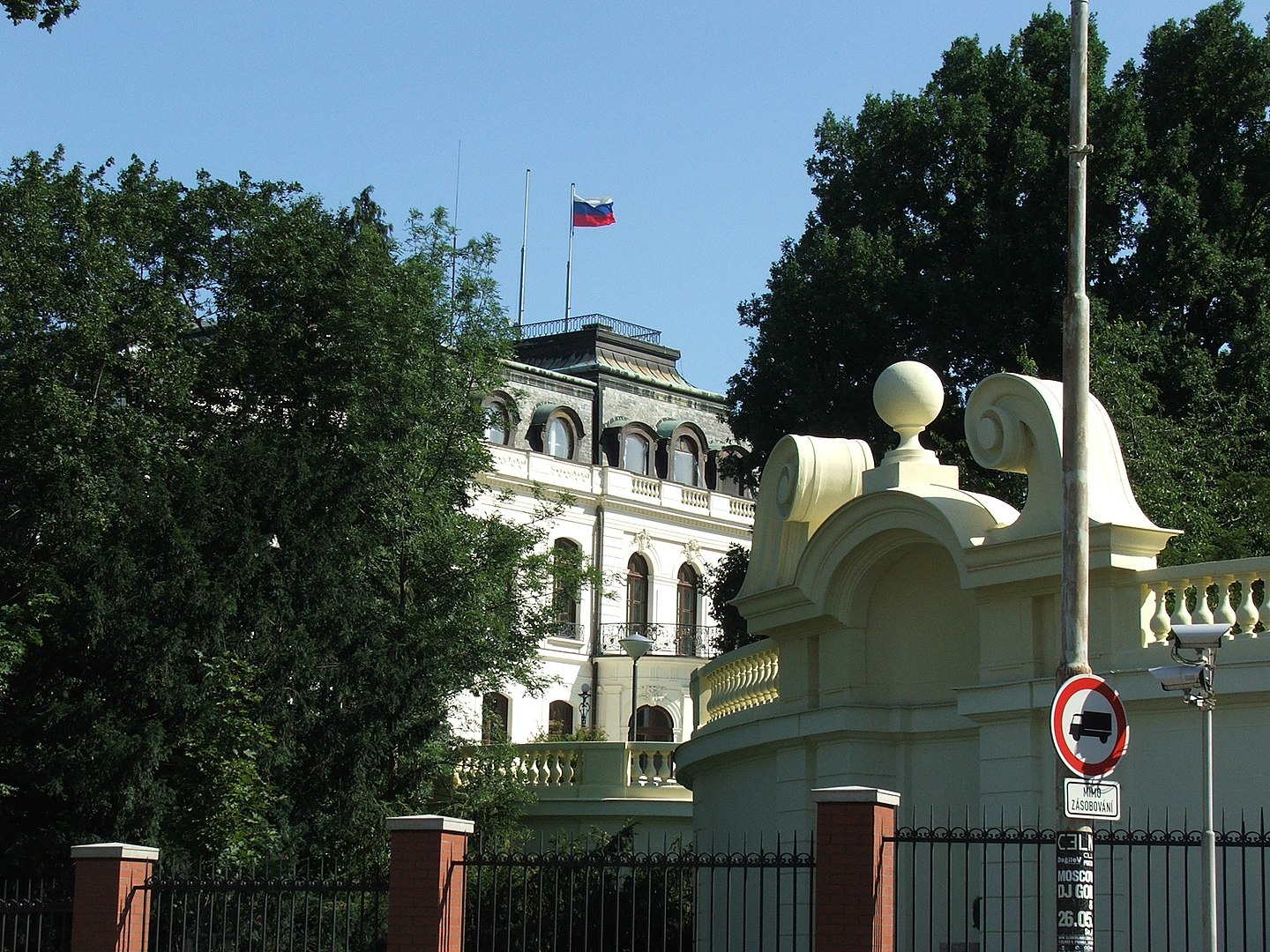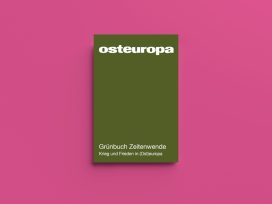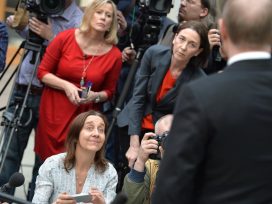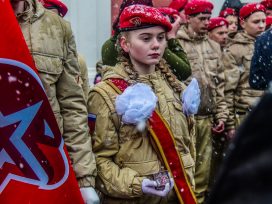Osteuropa: The Czech Security Information Service (BIS) has announced that a special unit of the Russian GRU military intelligence service was behind an explosion in an ammunition storage facility in 2014. The Czech government subsequently expelled 18 employees of the Russian Embassy in Prague. What exactly happened in 2014?
Vladimír Handl: On 16 October 2014, an ammunition depot exploded in Vrbětice, a small town in South Moravia near the border with Slovakia. It was located on the site of the state Military Technical Institute, but was rented by a private company dealing in military equipment called Imex Group from Ostrava, North Moravia. Two employees of the company were killed and nearby villages were evacuated. On 3 December, another explosion occurred on the site. No one was killed, but surrounding areas were evacuated again. The firefighting work and the immediate efforts to secure the surrounding ammunition depots took months. The clean-up work was only completed in 2019. The costs are estimated at around one billion Czech crowns (approx. 40 million euros).
Osteuropa: What exactly did the Czech secret services announce?
Vladimír Handl: The final report by the BIS (Bezpečnostní Informační Služba) is only available to the government. All information is therefore currently based on statements from government members who have access to the report, as well as background research. The following picture has emerged: the two men who, according to reliable information, carried out the poison attack on Sergei Skripal in the UK in March 2018 were in the Czech Republic at the time of the first explosion in 2014. They had arrived in Prague by plane from Moscow a few days earlier. They used passports issued in the names Alexander Petrov and Ruslan Baširov. They later travelled to the UK in 2018 under the same names. Their real identities would be given to the investigation into the Novichok attack as Anatoly Čepiga and Aleksandr Miškin. They are understood to be members of a special unit of the GRU, identified by the number 29155.
They had officially registered their interest in a visit to the weapons depot – but with passports issued in the names Ruslan Tabarov and Nikolaj Popa. However, they were not registered as visitors. It is therefore assumed that they either entered the poorly guarded depot to attach the explosive devices to batches of ammunition or were let in by an employee of the Imex Group company.
It is said that the ammunition was to have been delivered abroad and only destroyed once there. This assumption is based, among other things, on the fact that a second explosion took place on 3 December. That was probably the planned time for the detonation. The first explosive device exploded prematurely in Vrbětice in October while the ammunition was being loaded. The second explosion went according to plan, but due to the incident in October the device did not explode at its final destination, but in the Czech Republic. It remains to be clarified how the explosion could have occurred, given that the depot had been searched only a short while earlier. The two men returned to Moscow via Vienna immediately after the explosion. The Czech police have now put out an arrest warrant.
Osteuropa: What kind of ammunition was stored in Vrbětice? Who owned the facility?
Vladimír Handl: The information is unclear. Depot No. 16, where the first explosion took place in October 2014, stored 50 tonnes of artillery warheads. Artillery warheads were also stored in Depot No. 12, where the December 2014 explosion took place, or submachine guns, according to other reports.
It is understood that the ammunition and weapons were purchased by a Bulgarian arms dealer named Emilian Gebrev. He intended to deliver these to the Ukrainian army, which had been fighting Russian-backed separatists in the east of the country since early summer 2014. Other sources say the shipment was to have gone to Syria. Both accounts are credible. Around this time, explosions took place in several Ukranian munitions depots. The Bulgarian arms dealer was the target of two poison attacks in 2015, which like the attack in the UK were carried out with a substance from the Novichok group and attributed to the GRU’s special unit 29155, which is blamed for the explosions in the Czech Republic.
Osteuropa: Is there a connection between the publication of the findings and the Russian troop deployment on the border with Ukraine?
Vladimír Handl: Not directly. There is no indication that this is the reason that the government has decided to announce the results of the investigation. However, there is considerable pressure arising within NATO, and especially from the US, to take more decisive action against Russia. It can be assumed that the US was aware of the investigations into the explosions. If the Czech government had not published the findings, Washington might have beaten them to it. Apparently excerpts from the BIS report were already known to Czech media. Had the government hesitated, it would have come under pressure. However, such considerations only concern the timing of the report’s publication, not its content.
Osteuropa: Russia policy has been a hot topic in the Czech Republic for three decades. What was the domestic political situation in which the news of the results of the BIS report broke?
Vladimír Handl: The government of Andrej Babiš is in trouble. It is a minority government relying on the votes of Babiš’s ANO party and the social democratic ČSSD: it only had a majority in parliament because the Communist Party KSČM tolerated it. The KSČM has just withdrawn this support. The government is under daily threat of a vote of no confidence. Many are calling for early elections, but a new parliament will be elected in October whatever happens.
This makes the prime minister highly dependent on the president. According to the Czech constitution, the president mandates a person to form a government that can command a majority. The current president, Miloš Zeman, could also install a government of experts to govern during a transitional period without a parliamentary majority. He did this in 2013, and Jiří Rusnok’s government remained in office for seven months. At present, however, Zeman says that in the case of a vote of no confidence he would simply leave the government in office until the elections.
This is where Russia policy comes into play. Zeman is clearly a supporter of closer relations with Moscow. Old networks play a big role here. Zeman is using an economic argument, but he also supports demarcation from the EU in the name of national sovereignty. In principle, so the argument goes, the Czech Republic should stay out of all political issues, and muddle through in order to derive the greatest economic benefit from contacts with all sides.
Babiš also basically subscribes to this ‘apolitical’ position. Unlike Zeman, however, he has to rely on parliamentary majorities. His coalition partner, the ČSSD, is divided. But the pro-Moscow faction has the upper hand. The Communists are the pro-Moscow party in the Czech Republic anyway. If Babiš’s ANO no longer has a majority through the support these two parties, he will have to look for new coalition partners. Most of the parties, however, advocate a clearer demarcation from Russia. This is true for the Christian Democratic-Popular KDU-ČSL, for the Civic Democratic Party (ODS) and most of all for the Pirate Party.
The handling of information from BIS must be understood in this context. On the one hand, Babiš informed the public of the report and the government expelled 18 employees of the Russian Embassy in Prague. On the other hand, Babiš also tried to backtrack a little, arguing the attack was not against the Czech state, since it had been aimed at a Bulgarian weapons dealer.
Osteuropa: An interesting interpretation of the word ‘state terrorism’ How have Czech relations with Russia developed in the past 2 to 3 years?
Vladimír Handl: There has been a lot of cultural exchange, but this has been severely impacted by the COVID-19 pandemic since March 2020. Economically, relations have developed well, but at a very low level. Russia’s share of Czech foreign trade amounts to 2.5 percent, Germany’s to 28.5 percent, and that of all EU countries taken together to 73.5 percent.
The situation is different when it comes to political relations. On the one hand, the Czech Republic fully supports the EU’s sanctions against Russia – as well as those against Belarus. And at the bilateral level, a symbolic small-scale war is taking place. There was a big controversy over the relocation of a monument to the Soviet Marshal Konev in Prague’s 6th district. His troops had liberated the last prisoners of the Auschwitz concentration camp in 1945 and marched into Prague on 9 May 1945. But he was also commander-in-chief of the armed forces of the Warsaw Pact and deputy to the Soviet defence minister from 1955 to 1960. As such, he bore direct responsibility for the suppression of the 1956 uprising in Hungary. Some in the Czech Republic also attribute to him responsibility for the suppression of the Prague Spring in August 1968. In 2020, the government of the Prague district had the monument, which was erected in 1980 and has long been controversial, dismantled and taken to a depot. Moscow fumed. The press spokesperson for the Foreign Ministry, Maria Zacharova, spoke of a smear campaign being conducted by the Czech Republic.

Monument to Marshal Ivan Stěpanovič Koněv on Interbrigády Square in Prague-Bubeneč.
Photo by Gampe, CC BY-SA 4.0, via Wikimedia Commons
A similar situation has arisen around another issue, which has also strained relations. On 2020 February 2020, the Prague City Council, with the approval of the City Parliament, started the process of renaming the square where the Russian Embassy in Prague is located, to Boris Nemtsov Square. Five years earlier, the independent politician and critic of the Kremlin had been shot in the street in Moscow. This too, the Moscow Foreign Ministry saw as an aggressive act: attempted interference in Russia’s internal affairs. But that was not all. A short time later, Prague Mayor Zdeněk Hřib applied for police protection. He had learned from the Russian embassy that attacks were planned on people involved in the dismantling of the monument and the renaming of the square. It soon turned out that this information had emerged as part of an intrigue within the Russian embassy. Prague expelled two embassy staff, and Moscow responded in kind.
However, none of this should obscure the fact that the Czech government has repeatedly sought dialogue with Russia. Prague has repeatedly asked Moscow to discuss the state of relations. Indeed, a special envoy for consultations with Russia was appointed – the head of the Foreign Policy Department of the President’s Office, Rudolf Jindrák, who was Ambassador in Berlin from 2006 to 2014. Moscow did not respond.
Osteuropa: And Zeman?
Vladimír Handl: As I have said, he is playing his own role. In the case of Vrbětice, he said through his spokesperson that he would not comment for another week.
Zeman criticises EU sanctions and is an advocate of closer relations with Russia, especially economic. He advocates buying the Sputnik V vaccine from Russia, despite Slovakia’s bad experience. He has also pushed for the dismissal of Foreign Minister Tomáš Petříček, who belongs to that wing of the Social Democrats that is critical of close relations with Russia – and with China – and who had to leave his post at the beginning of April after a dispute with his party leader, Interior Minister Jan Hamáček.
The issue of who knew about the findings of the BIS report, and above all when, remains a tense question. Various sources indicate that the government was informed as early as 7 April. This situation makes the dismissal of Foreign Minister Petříček is all the more surprising. His party leader and acting successor as Foreign Minister, Jan Hamáček, was set to travel to Moscow on 19 April to negotiate the purchase of Sputnik V. Two days before, on a Saturday evening, Babiš announced the findings of the BIS to the public. Naturally, this meant that the trip was off. Since Hamáček probably knew about the attack in the ammunition depot, he now tried to present the planned trip as a cover for the government’s subsequent actions. But again, these domestic issues are not about the substance of the matter.
In his first statement, made a week after the publication of the first findings of the report by BIS, Zeman backed the government. Nevertheless, his position remains ambivalent: he does not reject the BIS accusations outright, but states that more investigation is needed, that there is no evidence yet. Of course, Russia’s pro-government media immediately picked up on this.
Osteuropa: What is the impact of the incident on Czech Russia policy?
Vladimír Handl: Relations have steadily deteriorated over the past 20 years. Moscow’s Foreign Ministry publicly accuses the Czech Republic of acting as a lackey of the USA. The response to the expulsion of the 18 embassy staff was clearly asymmetrical, i.e. a further escalation. Prague expelled 18 intelligence officers who had to leave the country within 48 hours. Moscow expelled 16 diplomats and four administrative staff and gave them only 24 hours.
The expulsion of 18 intelligence officers had no serious impact on the huge Russian embassy in Prague. Prior to the expulsion of the 18 people, around 130 people were accredited there – 48 diplomats and 81 people working in administration and as technical staff. For comparison: the US Embassy has 72 employees and that of the Federal Republic of Germany 26.
The Czech Embassy in Moscow now has only seven employees. The ambassador and the consular section will remain. The Czech embassy counsellor was also expelled. This too was an escalation, because Prague had not expelled the Russian embassy counsellor. Moscow could not care less about the impact on economic relations or on cultural and social exchange. Russia is not interested managing conflict, but in intensifying it.
Russia is sending the message: ‘We are stronger than you,’ but Prague has decided that it will not be intimidated. The new Foreign Minister Jakub Kulhánek has informed Moscow that the number of staff at the respective embassies must be the same from 1 June. Precisely how Russia will implement parity is for Moscow to decide. If it does not allow the return of the 20 expelled Czechs, 63 more diplomats and embassy staff in Prague will have to leave the Czech Republic by 31 May. Moscow calls this ‘unprecedented aggressiveness’ and has threatened asymmetrical sanctions, in other words a further escalation of the conflict. One possibility is to force the Czech embassy in Moscow to greatly reduce the number of local staff. But there is also talk of economic sanctions.
Osteuropa: Why do expulsions of diplomats play such a big role?
Vladimír Handl: This has to do with the fact that for many years the Czech BIS has stated in its reports that the embassy is a base of operations for Russian intelligence services – in addition to the GRU military intelligence service, the SVR foreign intelligence service, the FSB domestic intelligence service and the FSO Federal Security Service, which use Prague as a base for operations throughout East-Central Europe and beyond.

Embassy of Russian Federation in Prague, Czechia Photo by Hynek Moravec, CC BY-SA 3.0, via Wikimedia Commons
Friends of Russia in the Czech Republic will oppose such a move. These include not only Zeman, but also the former president Václav Klaus, who has now declared – rather in the style of Moscow propagandists – that the government is trying to use tales of the Russian spies making mischief in Moravia as a means of intimidating and controlling the population.
However, there are already two concrete consequences: The government has decided that the Russian state corporation Rosatom will not be permitted to bid for the contract to construct two new nuclear reactors at the Dukovany site. And all talk of Sputnik V is surely off the table.
This interview was conducted in German by Volker Weichsel on 20 April 2021 and updated on 26 April.








